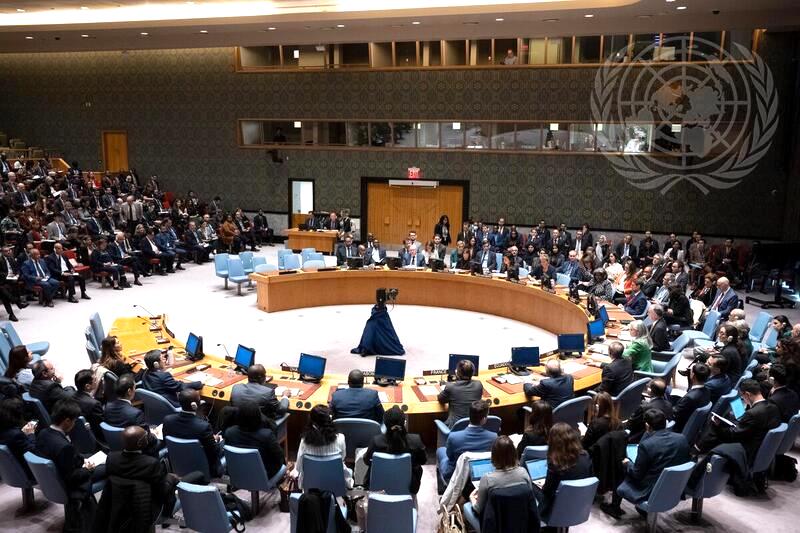The U.S. has again vetoed a Security Council resolution urging an immediate end to the killing in Gaza, in essence backing the ongoing genocide, writes Joe Lauria.

The Security Council on Oct. 18, when it failed to adopt a resolution calling for humanitarian pauses in Gaza due to a U.S. veto. (UN Photo/Evan Schneider)
The United States has once again voted for genocide before all the world.
There is no government in the world that has more power to put an end to probably the worst crime of the century than the United States.
And yet on Friday at the U.N. Security Council Washington vetoed a resolution that would have demanded an immediate ceasefire and an end to Israel’s unmitigated slaughter. The U.S. blocked the measure because it unequivocally wants the killing to continue.
It can talk all it wants about its rejection of the resolution because it did not condemn Hamas’ attack on Oct. 7. But the crux of the U.S. justification for a vote that has brought it worldwide condemnation is a willfully ignorant statement about the cause of this war.
In the U.S. explanation of its veto, the U.S. deputy ambassador Robert Wood said:
“Perhaps most unrealistically, this resolution retains a call for an unconditional ceasefire. I explained in my remarks this morning why this is not only unrealistic but dangerous: it would simply leave Hamas in place, able to regroup and repeat what it did on October 7. …
As long as Hamas clings to its ideology of destruction, any ceasefire is at best temporary and is certainly not peace. And any ceasefire that leaves Hamas in control of Gaza would deny Palestinian civilians the chance to build something better for themselves.”
This formulation reveals the U.S. government’s twisted thinking. The occupation of the West Bank and the blockade of Gaza are not the causes of this and previous wars, but instead Hamas’ “ideology of destruction.” Which stems from what? Just some evil DNA?
Thus for the U.S. the solution is not ending the occupation but maintaining the slaughter supposedly to destroy Hamas, even though Israel has killed relatively few of its fighters and none of its top commanders and is instead waging a war of annihilation against the Gazan people.
World Not Buying It
This is clear in every capital of the world, including Washington. The worldwide reaction to the U.S. veto shows an understanding that the United States, that great champion of human rights, unequivocally supports genocide.
The veto was a slap in the face of U.N. Secretary General Antonio Guterres, who took the rare move of invoking Article 99 of the U.N. Charter to call for the Security Council to act.
He wrote to the Council that “amid constant bombardment by the Israeli Defense Forces and without shelter or essentials to survive, I expect public order to completely break down soon due to the desperate conditions, rendering even limited humanitarian assistance impossible.”
In response, the United Arab Emirates drew up a resolution that expressed “grave concern” over the “catastrophic situation” in Gaza. The resolution demanded an immediate humanitarian ceasefire, immediate and unconditional release of hostages and humanitarian access.
Thirteen countries, including U.S.- ally France, voted in favor, Britain abstained, and the U.S., the one country that can end the bloodshed, vetoed.
Anger at the U.S. spread quickly.
Palestinian President Mahmoud Abbas said the U.S. veto made it “complicit” in war crimes. “The president has described the American position as aggressive and immoral, a flagrant violation of all humanitarian principles and values, and holds the United States responsible for the bloodshed of Palestinian children, women and elderly people in the Gaza Strip,” Abbas’ office said in a statement.
Avril Benoit, executive director of Doctors Without Borders (Medecins Sans Frontieres, or MSF) USA said:
“By vetoing this resolution, the US stands alone in casting its vote against humanity. The US veto stands in sharp contrast to the values it professes to uphold. By continuing to provide diplomatic cover for the ongoing atrocities in Gaza, the US is signaling that international humanitarian law can be applied selectively — and that the lives of some people matter less than the lives of others …. The US veto makes it complicit in the carnage in Gaza.”
Human Rights Watch said in a statement: “By continuing to provide Israel with weapons [and] diplomatic cover as it commits atrocities, including collectively punishing the Palestinian civilian population in Gaza, the US risks complicity in war crimes.”
It takes a special kind of arrogance to ignore such criticism.
Joe Lauria is editor-in-chief of Consortium News and a former U.N. correspondent for The Wall Street Journal, Boston Globe, and other newspapers, including The Montreal Gazette, the London Daily Mail and The Star of Johannesburg. He was an investigative reporter for the Sunday Times of London, a financial reporter for Bloomberg News and began his professional work as a 19-year old stringer for The New York Times. He is the author of two books, A Political Odyssey, with Sen. Mike Gravel, foreword by Daniel Ellsberg; and How I Lost By Hillary Clinton, foreword by Julian Assange.
(First published on December 10, 2023)


No comments:
Post a Comment